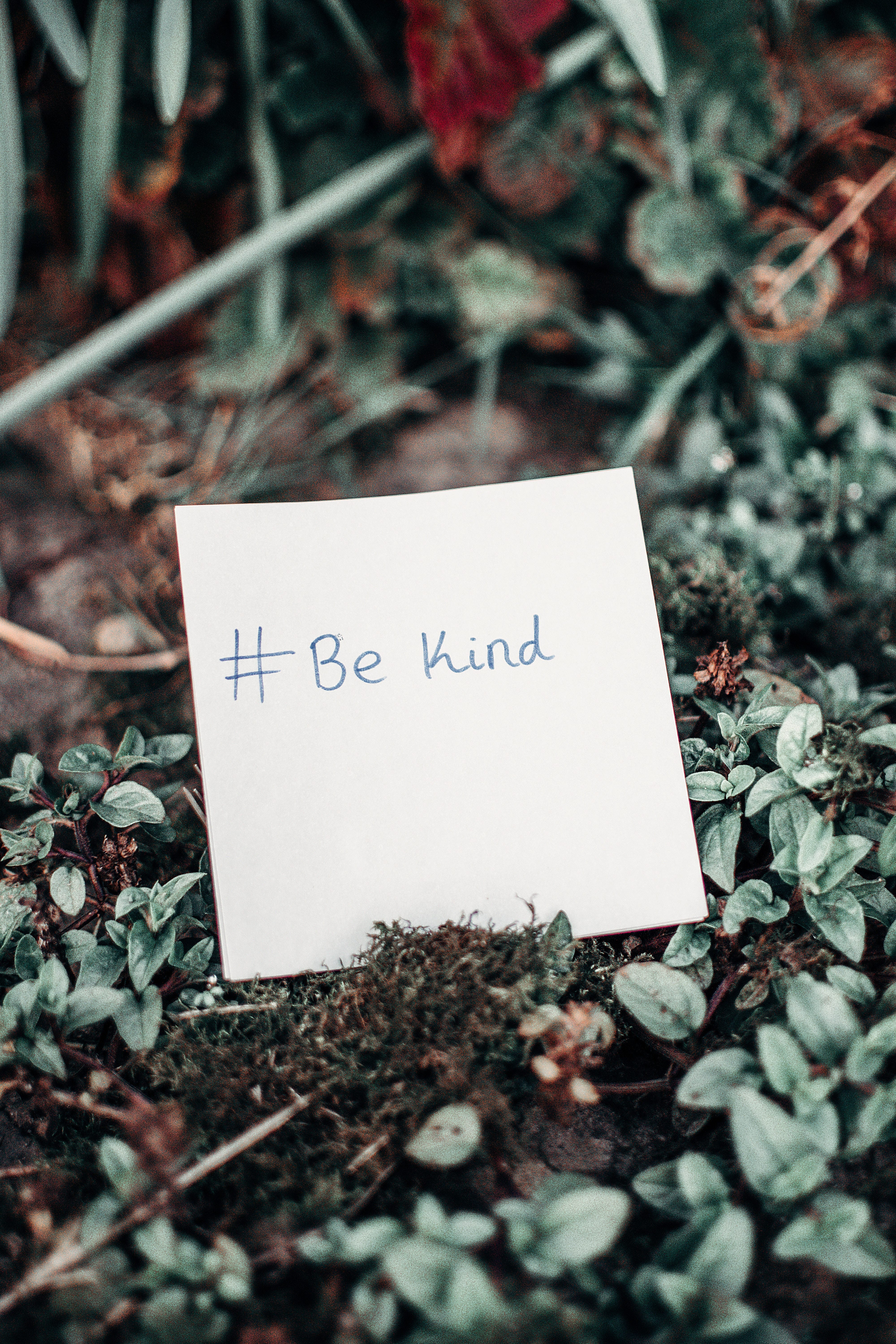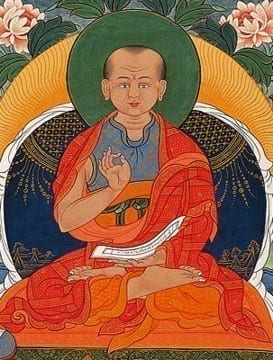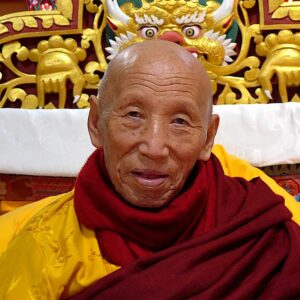Societal Human Values Series #11
Tibetan Emperor Songtsen Gampo, (Srong-brtsan-sgam-po), reigned 629-650 CE. Among his many achievements, he promoted a moral code known as the Sixteen Principles of Societal Human Values (mi chos gtsang ma bcu drug). As the Dalai Lama’s translator Thupten Jingpa writes, “Most of these sixteen values have to do with promoting greater societal well-being and living one’s life with dignity, honesty, and respect for others.”
Phakchok Rinpoche frequently emphasizes the importance of living respectfully in society. He encourages students to memorize and internalize these points of conduct as a core foundation for our practice of the Dharma. If we don’t keep this moral code, then whatever higher practices we engage in will be unlikely to bear much fruit.
This is the eleventh in a series of explanations of these sixteen principles.
Principle #11: Repaying Those Who Have Previously Shown Kindness (ngar drin chen gyi mi tsé ché pa)
Repaying kindness can bring joy to both ourselves and others. By training our minds, we can learn to delight in our mutual care.
If we examine the Tibetan terminology in this eleventh principle, the message is more direct. The Tibetan verb, “gcad pa” here translates as “to cut off, or to undermine or condemn”. Thus, a literal translation would be “Don’t cut off or condemn those who have previously shown kindness”. Instead, choose to remember!
Consider that slight difference in tone–can we open our hearts to those with whom we disagree? Maybe right now we’re having difficulties or problems with a particular person or group of people. But, has it always been this way? If even in our pain or in the heat of an argument, we can recall previous kindness then we might also observe how our hurt subsides.
Most of us have had this experience. We may have argued or even had a big fight with a family member or a friend. And we may still feel pain or irritation. However, if we start to recall a time when that person showed us love and care, don’t we begin to unclench? Doesn’t our anger lessen or even dissolve?
Start Small
When we slow down and pay attention to the many small acts of kindness that a person or group offered us, we relax and stop defending ourselves. And if we can come to recognize how regularly we receive kindness, our minds and hearts will automatically begin to open. When we train we start by paying close attention to even small kindnesses.
Some scientific researchers have argued that humans seem to have a “negativity bias”. By this, they mean that we tend to remember and to fixate on bad experiences or memories and minimize or forget the good.1See, for example, Rick Hanson, “Overcoming the Negativity Bias” at https://www.rickhanson.net/overcoming-negativity-bias/ and Rozin,Paul; Royzman, Edward B. (2001). “Negativity bias, negativity dominance, and contagion”. Personality and Social Psychology Review. 5 (4): 296–320. These traits may have been necessary to our evolution as a species, but they don’t have to dominate our interactions. In this principle, the king advises us not to cut off or forget those who smoothed our way in the world.

Instead, if we choose to remember, and focus on positive interactions, we can experience a shift in our relationships. As we pause to reflect on the vast amount of kindness that we have encountered in our lives, we may begin to feel less lonely, and more connected to others. Thus, when we remember others’ kindness to us, we are treating ourselves more kindly as well.
Exercise on Recalling Kindness
Try this for yourself. If you are feeling a little down, or lonely–take a moment to consider how you have received a demonstration of human kindness today. Did a family member do something helpful–even if it seems routine? Maybe your child smiled with delight, or your partner squeezed your hand or shoulder with genuine warmth.
When you eat a meal or drink a glass of water or cup of tea today, can you pause and think about the kindness of those who brought that to you? This reflection can create a sense of wonder and amazement!
Don’t worry if it feels forced or a little phony when you start this exercise. We’re often just not used to looking for these small kindnesses, so we may miss them if we don’t pause and pay attention.
Kindness and Interconnectedness
The Dalai Lama teaches frequently on mind training, basing his explanation on Geshe Langri Tangpa’s Eight Verses of Training the Mind. In one of those teachings, he reminds us of our interconnectedness:
In one sense, we can say that other sentient beings are really the principal source of all our experiences of joy, happiness, and prosperity, and not only in terms of our day-to-day dealings with people. We can see that all the desirable experiences that we cherish or aspire to attain are dependent upon cooperation and interaction with other sentient beings. It is an obvious fact. …Basic joys and comforts of life such as food, shelter, clothing, and companionship are all dependent upon other sentient beings, as is fame and renown. Our feelings of comfort and sense of security are dependent upon other people’s perceptions of us and their affection for us. It is almost as if human affection is the very basis of our existence. Our life cannot start without affection, and our sustenance, proper growth, and so on all depend on it. In order to achieve a calm mind, the more you have a sense of caring for others, the deeper your satisfaction will be. I think that the very moment you develop a sense of caring, others appear more positive.2https://www.dalailama.com/teachings/training-the-mind/training-the-mind-verse-1. Teaching given 8 November 1998 in Washington D.C.

Here, the Dalai Lama urges us to vastly expand our awareness of kindness. We can train ourselves to notice the goodness that manifests within the entire web of existence. When we acknowledge how we depend on others, we appreciate our experience of the world. We don’t cut off others.
Appreciating Kindness Results in a Happier Life
The great Tibetan scholar and Rimé master, Ju Mipham Rinpoche wrote:
People who forget the kindness of others
Are the lowest of human beings.
Those who appreciate and repay others’ kindness
Are considered glorious lords among people.3Jamgon Mipham, The Just King: The Tibetan Buddhist Classic on Leading an Ethical Life, trans. By Jose Ignacio Cabezon, Shambala: 2017, p. 91.
When we investigate Buddhist ethical codes, we customarily focus on the long-term benefits of actions. But at the same time, when we adopt these behavioral principles we can often reap more immediate rewards. As Mipham Rinpoche reminds us, even ordinary people who aren’t contemplating big ethical questions praise those who recall and repay kindnesses. Put very simply, if we don’t abandon those who have been kind, people will like and respect us. This isn’t the reason we choose to repay a kindness, but it is an automatic response to our behavior. And that also makes daily life just a bit more pleasant, doesn’t it?
Share With Us
If you’ve tried to apply this principle in your everyday life, what have you observed? Has deliberately recalling kindnesses made an impact on your behavior or your mood? Please share your experience in the comments section below!










Responses